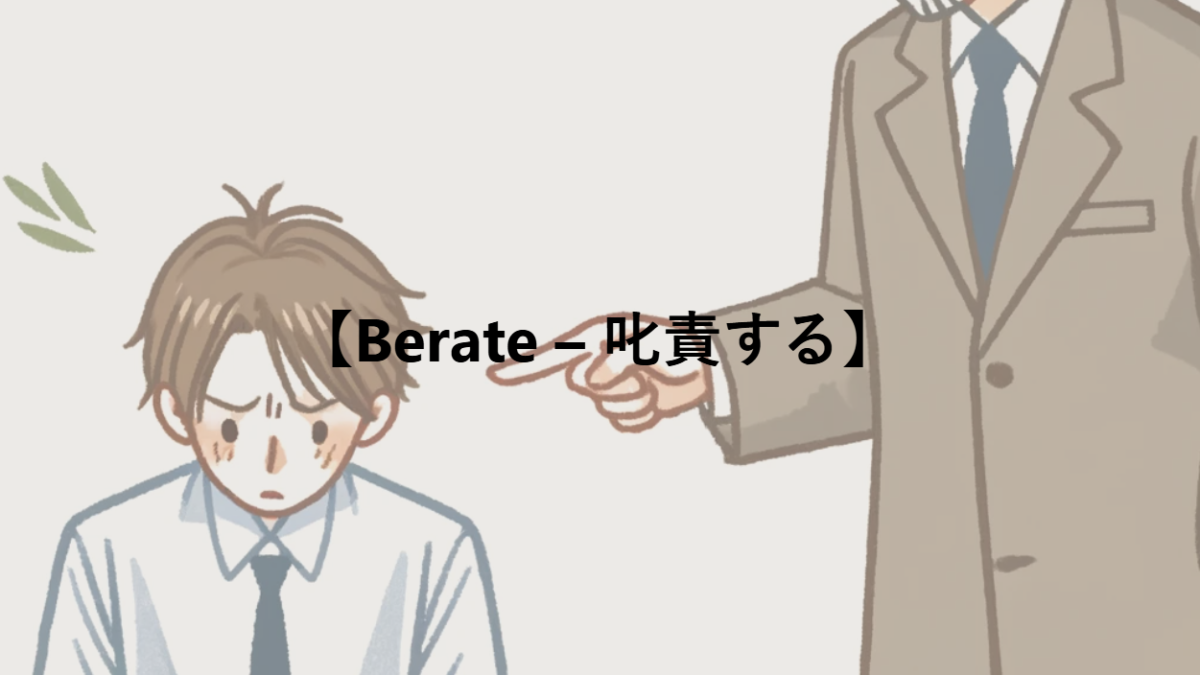語源・類義語・反対語・例文
【Berate – 叱責する】という単語の語源とか由来を知っていますか?
「Berate」という単語は、おそらく16世紀ごろに使用され始めました。この単語は、中英語の「rate」という動詞から派生しています。「rate」は、「非難する」や「評価する」という意味があり、さらにその起源は、古フランス語の「reter」や、より古いラテン語の「reputare」にさかのぼることができます。これらの言葉は、「考える」「計算する」などの意味を持っていました。時が経つにつれ、「rate」は批評や批判のニュアンスを帯びるようになり、「berate」はその強化形として、「激しく非難する」や「叱責する」という意味を持つようになりました。
The word “berate” likely began to be used around the 16th century, derived from the Middle English verb “rate,” which meant “to blame” or “to evaluate.” Further back, its origins can be traced to the Old French word “reter” and even to the older Latin “reputare,” which meant “to consider” or “to calculate.” Over time, “rate” acquired nuances of criticism and evaluation, and “berate” emerged as an intensified form, meaning “to scold vehemently” or “to rebuke.”
この単語の類義語・反対語を教えてください。
類義語
- Scold: 叱る、しかる。
- Reprimand: 叱責する。
- Rebuke: 非難する。
- Chastise: 懲戒する。
- Criticize: 批判する。
- Upbraid: 叱責する。
- Castigate: 厳しく非難する。
反寧語
- Praise: 褒める。
- Commend: 称賛する。
- Applaud: 拍手を送る、賞賛する。
- Approve: 承認する。
- Compliment: 賛辞を送る。
- Encourage: 励ます。
- Support: 支持する。
この単語に似た単語で間違いやすい単語はありますか?
- Bereave: 「奪う、失わせる」という意味ですが、「berate」とは全く異なる意味合いです。「Bereave」は、死などによって大切な人を失うことを表します。
- Beret: 「ベレー帽」という意味の単語で、頭にかぶる帽子の一種を指します。音は似ていますが、意味は全く異なります。
- Berate: これは一般的な英単語ではありませんが、タイプミスによって「berate」と混同されることがあります。
- Relate: 「関連づける」という意味ですが、「re-」と「-late」の部分が「berate」と似ているため、速く話すときに混同されることがあります。
この単語を使った例文を5つほど教えてください。
The teacher berated the student for not completing the assignment on time.
(教師は生徒を時間通りに課題を提出しなかったことで叱責しました。)
The manager berated the employee for their repeated mistakes.
(マネージャーは従業員を繰り返すミスのために叱責しました。)
She berated her friend for betraying her trust.
(彼女は友人に信頼を裏切られたことで叱責しました。)
The coach berated the team for their lack of effort in the game.
(コーチは試合中の努力不足に対してチームを叱責しました。)
He berated himself for his carelessness and vowed to do better next time.
(彼は自分の軽率さに対して叱責し、次回はより良くすることを誓いました。)
【Berate – 叱責する】のコロケーション
- Berate someone for something: 「何かのために誰かを叱責する」。特定の行動や失敗に対して、誰かを厳しく非難する場合に使用されます。
- Berate oneself: 「自分自身を叱責する」。自分の行為やミスに対して、内心で自分自身を厳しく責める状況を表します。
- Publicly berate: 「公然と叱責する」。人前で、または公の場で他の人を厳しく非難することを意味します。この行為は、叱責される人にとって特に恥ずかしいものになることがあります。
- Berate loudly: 「大声で叱責する」。声を上げて、非常に厳しく誰かを非難する様子を表します。この表現は、声の大きさを強調しています。
- Berate for incompetence: 「無能のために叱責する」。仕事や特定のタスクをうまくこなせないことに対して、誰かを厳しく非難する場合に用いられます。
「Berate」とは「叱責する」という意味を持つ英単語で、人の行為や成果に対して強い不満や怒りを表現する場面でよく使用されます。この単語は、特に厳しい言葉での非難を伴うことが多く、さまざまな状況で用いられます。
まず、”Berate someone for something”は、「何かのために誰かを叱責する」という意味です。これは、ある具体的な行為やミスに対して、人を厳しく非難する際に使われる表現です。
次に、”Berate oneself”とは、「自分自身を叱責する」ことを意味します。個人が自分の行動や失敗について内心で自分自身を非難する状況を指します。
“Publicly berate”は、「公然と叱責する」という意味で、公の場で他人を厳しく非難する行為を指します。このような叱責は、受ける側にとって特に辱めとなることがあります。
“Berate loudly”とは、「大声で叱責する」ということで、誰かを非常に大きな声で厳しく非難する様子を表します。ここでは、非難の声の大きさが強調されています。
最後に、”Berate for incompetence”は、「無能のために叱責する」という意味です。これは、誰かが仕事や特定の課題を適切にこなせなかったときに使われる表現です。
“Berate” is an English word meaning “to scold” and is often used in situations where strong dissatisfaction or anger towards someone’s actions or outcomes is expressed. This term is frequently associated with harsh criticism and is used in various circumstances.
Firstly, “Berate someone for something” means “to scold someone for a particular reason.” It is a phrase used when someone is being severely criticized for a specific act or mistake.
Next, “Berate oneself” refers to “scolding oneself.” This denotes a situation where an individual internally criticizes themselves for their own actions or failures.
“Publicly berate” means “to scold openly,” and it refers to the act of harshly criticizing someone in a public setting. This kind of rebuke can be particularly humiliating for the recipient.
“Berate loudly” implies “to scold loudly,” depicting a scenario where someone is being severely criticized with a very loud voice. Here, the emphasis is on the volume of the criticism.
Lastly, “Berate for incompetence” means “to scold for incompetence.” It is a phrase used when someone is criticized for not properly handling a job or a specific task.
berateを使った文法問題
- The coach _____ the team for their lackluster performance during the game.
- (A) berating
- (B) berate
- (C) berated
- (D) berates
解答と解説: (C) berated
解説: コーチがチームを叱ったのは過去の出来事なので、過去形のberatedが適切です。
- The manager was known to _____ employees for even minor mistakes.
- (A) berating
- (B) berate
- (C) berated
- (D) berates
解答と解説: (B) berate
解説: be known to do ~ で「~することで知られている」という意味になります。to不定詞の後なので動詞の原形であるberateが適切です。
- The customer _____ the waiter for the slow service and cold food.
- (A) berating
- (B) berate
- (C) berated
- (D) berates
解答と解説: (C) berated
解説: 客がウェイターを叱ったのは過去の出来事なので、過去形のberatedが適切です。
- It is never productive to _____ someone in front of their colleagues.
- (A) berating
- (B) berate
- (C) berated
- (D) berates
解答と解説: (B) berate
解説: to不定詞の後は動詞の原形が来ます。
- The parent _____ the child for running into the street without looking.
- (A) berating
- (B) berate
- (C) berated
- (D) berates
解答と解説: (C) berated
解説: 親が子供を叱ったのは過去の出来事なので、過去形のberatedが適切です。

